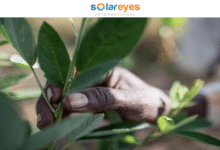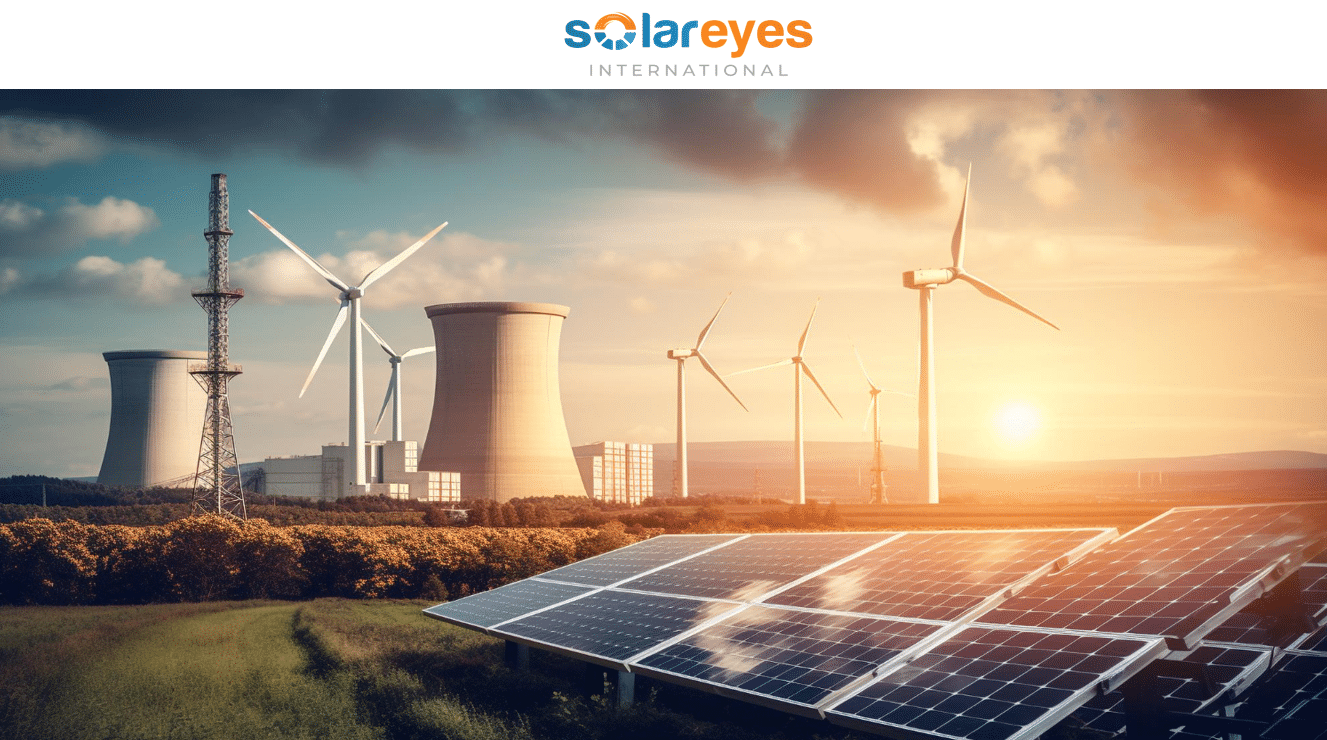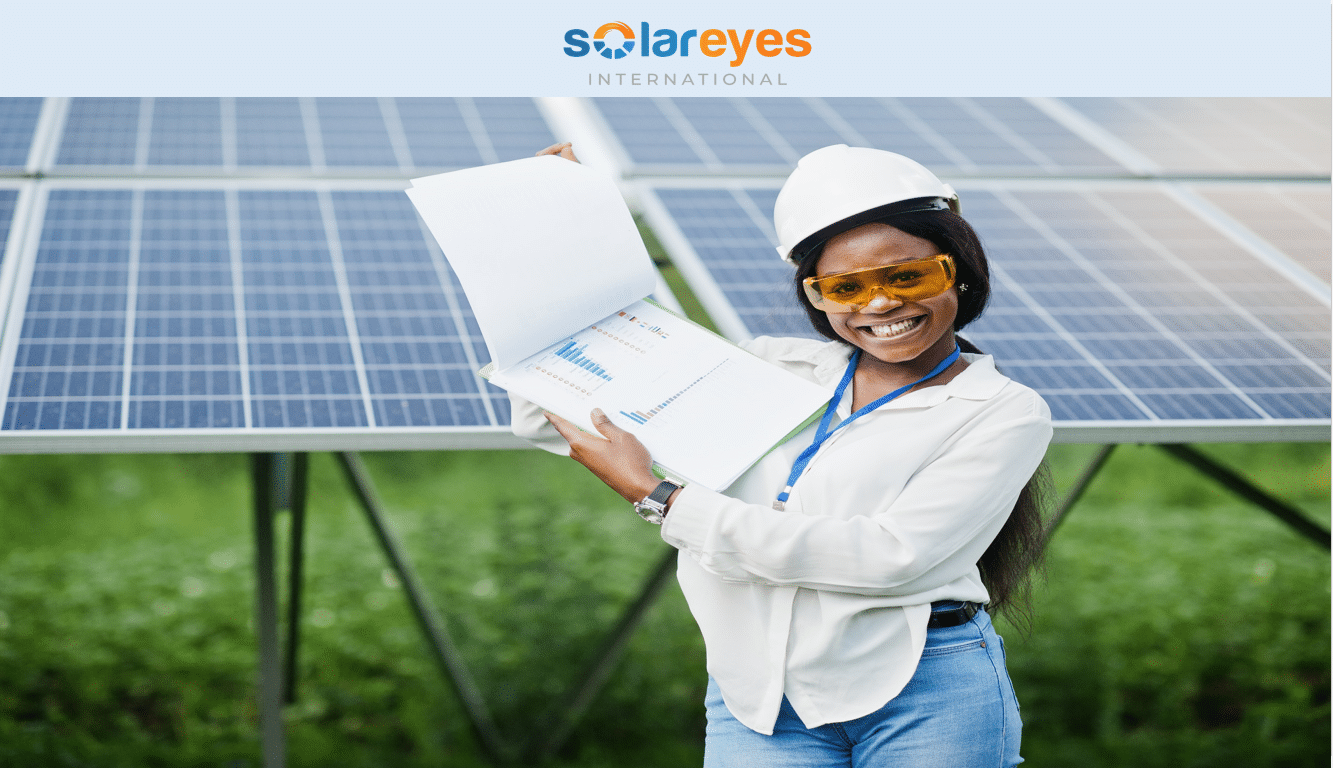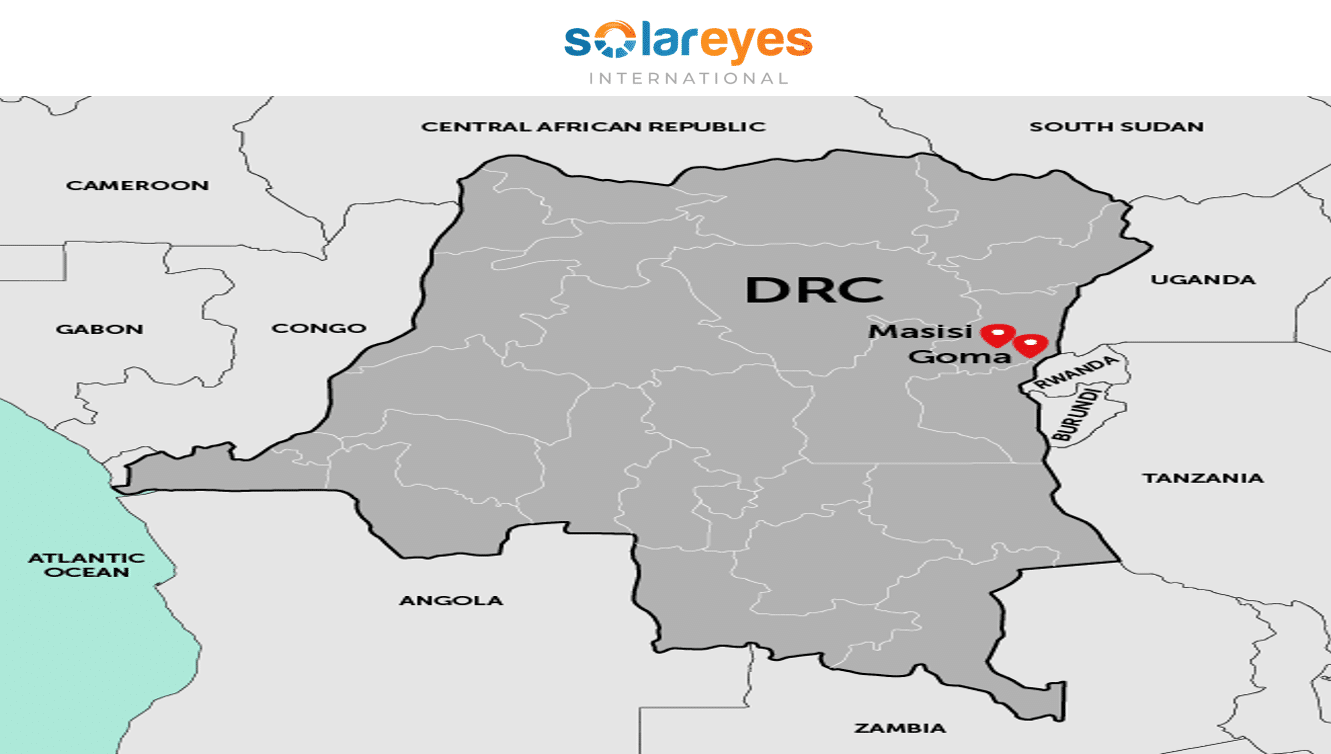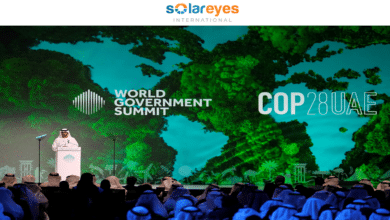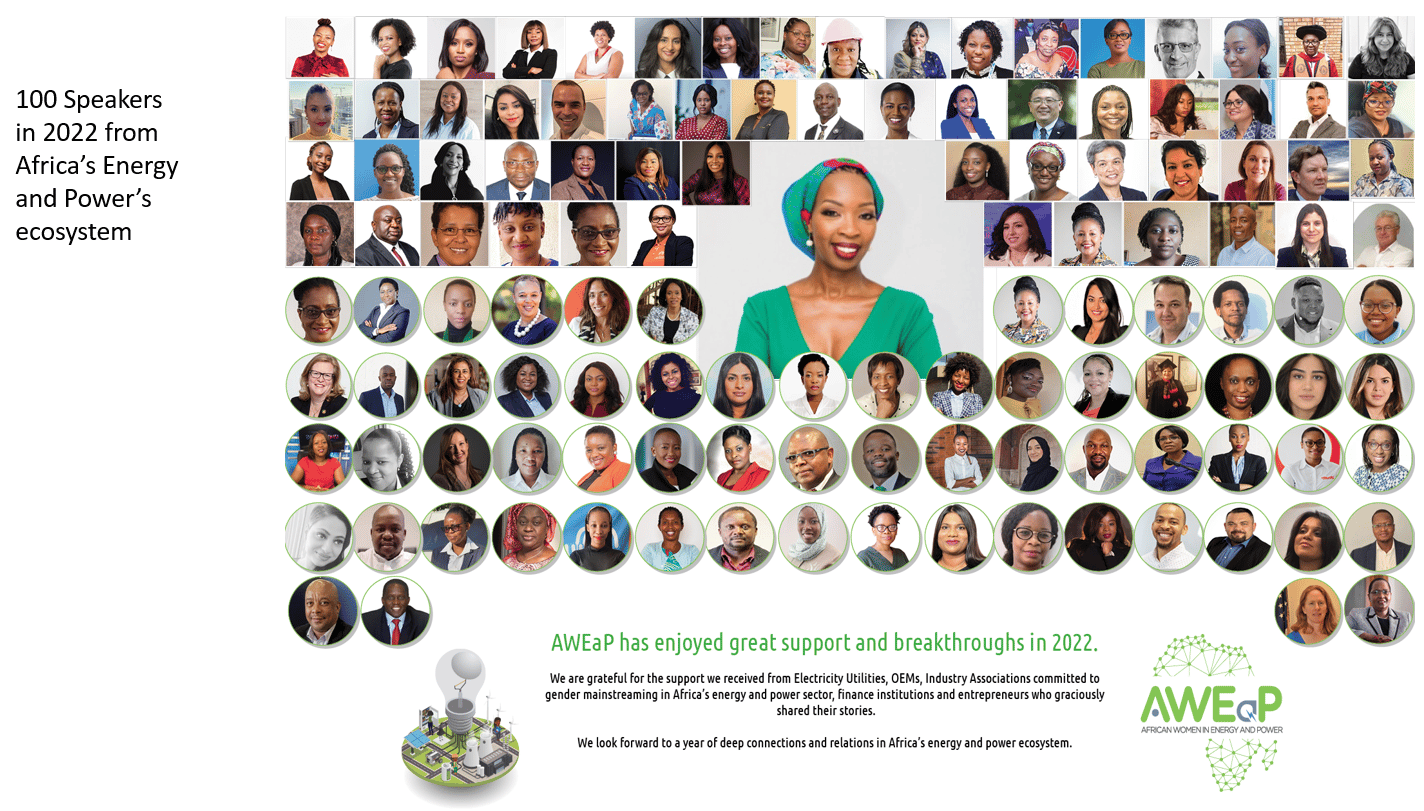
About African Women in Energy and Power (AWEaP)
African Women in Energy and Power (AWEaP) is a Non-profit company established to accelerate African women entrepreneurs’ participation in the Power and Energy sector.
AWEaP is premised on the conviction that in order to eradicate energy poverty on the African continent, Africa needs commercially viable, multi-stakeholder-driven initiatives that will ensure the meaningful economic participation of women in the energy and power sector.
AWEaP as an organization is endorsed by:
- The Southern African Power Pool
- Eskom South Africa
- She in Energy Africa
- Africa Women Energy Entrepreneurship Framework
- Consulting Engineers South Africa (CESA)
- Engineering Council of South Africa (ECSA)
- African Leadership Group
*** ALSO CHECK: 12 CHALLENGES FACED BY SOLAR COMPANIES IN DEVELOPING COUNTRIES
AWEaP implements the following programmes:
AWEaP runs the following programmes.
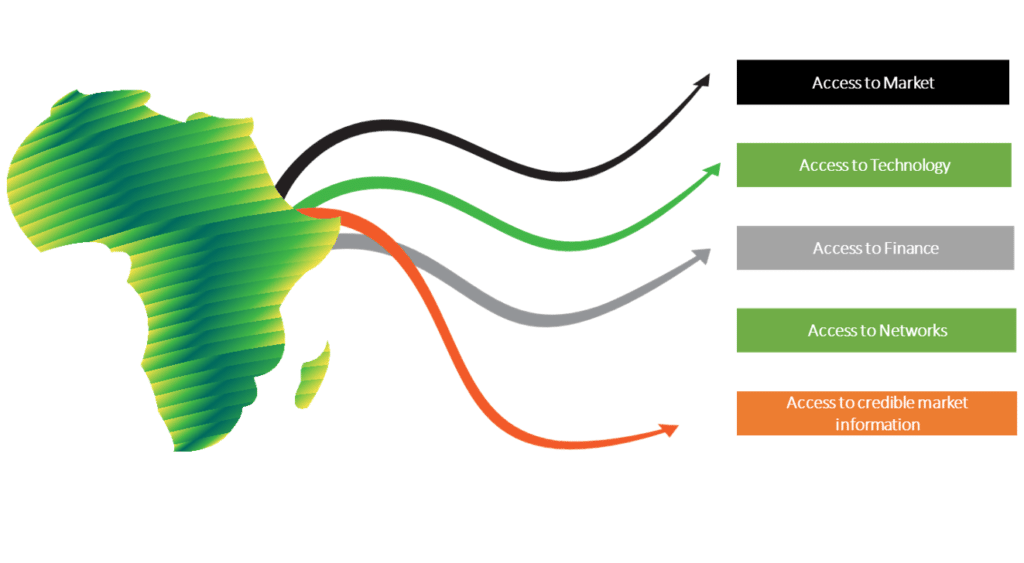
1. AWEaP Just Energy Transition Skills Development programme
A tailored Just Energy Programme Skills Development Programme. The programme is designed to empower marginalised groups with the necessary knowledge to participate in local JET strategy design and opportunities presented in both existing, emerging and new energy technology value chains.
AWEaP has signed an MOU with Wits Business School’s (WBS) African Energy Leadership Centre, the academic partner of the programme.
WE CARE SOLAR – 1000+ Solar Suitcase Installations Milestone Reached in Zimbabwe
On the programme, the center delivers the academic element of the programme through a hybrid course of live streaming lessons and in-person contact sessions.
This programme is endorsed by the following industry leaders:
- Association of Municipal Electricity Utilities – (AMEU)
- South African Local Government Association – (SALGA)
- Department of Women, Youth and Persons with Disability (DWYPD)
- Eskom
- UN Women South Africa
- Municipal Infrastructure Support Agency (MISA)
- Business Unity South Africa, Energy Working Group (BUSA)
- South African National Energy Development Institution (SANEDI)
- BRICS Women Alliance (BWA)
- Women’s Economic Assembly – The Presidency – WECONA
- Department of Small Business Development
- Southern African Power Pool (SAPP)
- The Mpumalanga Green Cluster Agency
- The Energy and Water SETA
2. AWEaP Channel Partner Programme
Addressing access to technology across the full value chain of energy, power and digital technology for women entrepreneurs through an integrated channel partner programme.
Building Women Channel Partners across the full value chain of energy, power and digital technology.
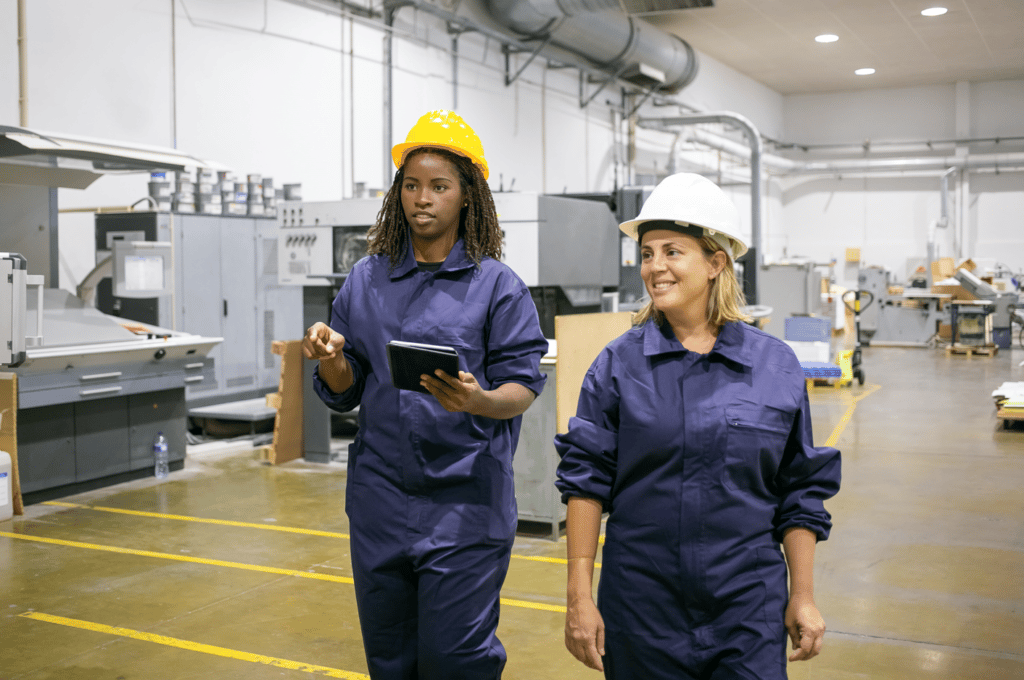
Through the programme, AWEaP recruits women owned and managed energy and power companies to become channel partners for designated technologies, products, renewable energy solutions and systems in South Africa.
Participating Original Equipment Manufacturers (OEMs) train women entrepreneurs to be competent representatives of their technologies and successful system integrators.
*** ALSO CHECK: 12 CHALLENGES FACED BY SOLAR COMPANIES IN DEVELOPING COUNTRIES
AWEaP wants to create a database of credible suppliers into the global supply chains of OEMs operating in the Renewable Energy and Green Tech Sectors in South Africa and the African Continent.
This programme is endorsed by:
- Department of Small Business Development – South Africa
- BRICS Women Business Alliance – South Africa Chapter
***ALSO CHECK: HOW TO SIZE A SOLAR SYSTEM – 5 clear steps anyone can follow
3. AWEaP Market Information Webinars
A platform for access to credible energy and power market information for aspiring entrepreneurs: women, youth and persons with disabilities.
In the energy and power sector, AWEaP believes that unless women KNOW and UNDERSTAND the entrepreneurial opportunities that exist in the sector, they will not be able to:
- opt to participate in the sector,
- choose an area of focus (or areas that resonate with their business interests),
- align themselves with the relevant actors in the ecosystem;
- access credible market information ;
- organize themselves to participate effectively and sustainably
The representation of women-owned companies in the energy and power sector remains poor.
To address this, we have created information-sharing and sector orientation sessions for women entrepreneurs interested in the energy and power sector.
Previous AWEaP annual webinars were sponsored by:
- Siemens Pty Ltd
- Rockwell Automation
- General Electric – Gas
- The Women, Voice and Leadership South Africa (WVL-SA) Programme, a grant funded by Global Affairs Canada (GAC) under Canada’s Feminist International Assistance Policy (FIAP) launched in 2017.
AWEaP’s notable achievements in 2022.
Under Ms Bertha Dlamini’s stewardship AWEaP has achieved a number of milestones. Some of these milestones include:
Some of AWEaP’s awards include:
1. Organisational achievements
Below is the list of AWEaP’ global and general awards to date.
- AWEaP has 11 chapters on the continent.
- It has reached over 5000 women since its establishment in 2018.
- Its professionally designed webinars with carefully industry-relevant curated content has been attended by over 2000 delegates since 2020.
- AWEaP has an advisory board of 22 members from around the world.
AWEaP is targeting 22 countries in Africa by 2024 and will grow to 45 by 2025. The organization is constantly looking for leading women in Africa’s energy and power sector who want to join their growing number of Country Chairpersons and advance gender equity in their domestic markets.
The programme invites and encourages large private sector enterprises in partnership with government, to support, nurture and develop Small Micro Medium Enterprises (SMMEs) within the electrotechnical sector’s supply chain. Local and Multinational OEMs are welcome to join the programme.
HOW TO START A SOLAR COMPANY – do these 6 things and make money through solar
2. AWEaP Just Energy Transition Skills Development programme
- Trained 32 women from municipal electricity utilities and government departments in Mpumalanga, South Africa.
- Expanding the programme to target a further 120 candidates from 3 provinces in 2023.
3. AWEaP Channel Partner Programme
The South African Electrotechnical Export Council (SAEEC) has partnered with African Women in Energy and Power NPC (AWEAP) to deliver a targeted and Sector-Specific Channel Partner Programme for the energy power and digital electronics sector.
This programme has the objective to recruit and train predominantly women-owned and managed energy and power companies to become channel partners for technologies, products, renewable energy solutions and other systems designated for localization in South Africa.
It also aims to create a database of credible suppliers for South Africa and the global supply chains of Original Equipment Manufacturers (OEMs) operating in the Renewable Energy , Green Tech and Digital Technology Sectors in South Africa and the African Continent.
This program aims to encourage large private sector enterprises in partnership with government, to support, nurture and develop Small Micro Medium Enterprises (SMMEs) within the electrotechnical sector’s supply chain.
This will be launched at the Africa Energy Indaba on the 7 March 2023.
ENERGY SAVING TIPS – 7 tips to save money through energy savings
4. AWEaP Market Information Webinars
AWEaP has successfully delivered market information sharing webinars partnering with industry leaders globally. Some highlights from the 2022 Series of webinars:
- 100 speakers from across the continent and the world
- 21 African electricity markets showcased
- 16 African electricity utility presentations
- 44 countries from around the world represented (as delegates)
- 80% women attendees
- 18 Entrepreneurs showcased
- 6 Global OEMs showcased their technology with Rockwell Automation attending 12 webinars
- 6 Global Independent Power Producers
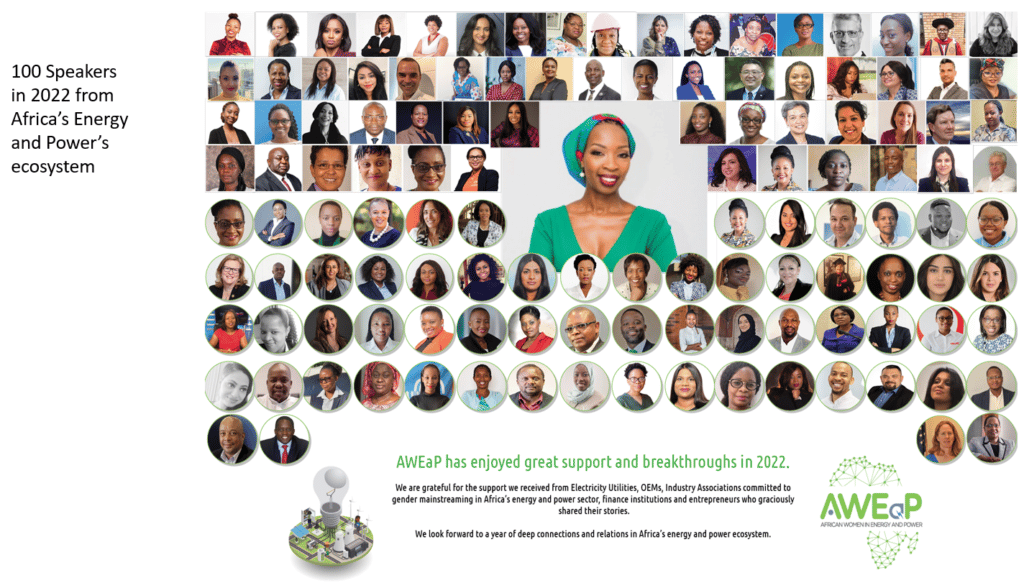
5. Regional Awards
AWEaP won the WVL SADC Protocol@Work Climate Change 2021 Award in recognition of its outstanding contribution in the promotion of gender equity in the Energy and Power Sector.
Why Women in Energy and Power and Why African countries?
MS Dlamini shares her thoughts on why gender mainstreaming is important in Africa’s energy and power sector.
It is time to accelerate women’s participation in Africa’s Power and Energy Sector – meaningful participation in the value chains of power generation, transmission, distribution, and efficient energy usage.
Ms. Bertha Dlamini, President, AWEaP
As Africans we cannot eradicate energy poverty in the continent without the meaningful economic participation of women.
It is increasingly recognized that women often face greater risks from climate change and other environmental phenomena than men, due to differences in their vulnerabilities and exposures to environmental and occupational hazards, structural gender inequalities as well as socioeconomic and cultural factors.
Women tend to be disproportionately impacted by climate change, deforestation, land degradation, desertification and water scarcity, especially in developing countries.
Women have a significant role to play and have the contextual insight to exploit existing and emerging opportunities in Africa’s power and energy sector.
The benefits of increasing women’s participation in employment and leadership roles have been globally recognized, and gender inequality is recognized as a constraint to economic growth.
However, many barriers continue to prevent women from working and enterprising in the energy sector.
Studies have shown that companies with strong female leadership deliver a 36% higher return on equity and that companies with at least one female executive board member outperformed those with male-only boards.
Zimbabwe Announces Solar Incentives for 1GW IPP Projects
As for the energy sector, it has been demonstrated that a lack of gender equality puts utilities at a disadvantage, with boards with at least 30% women having higher profit margins than those that do not. It has also been suggested that energy sector organizations that improve gender equality can boost innovation.
During the 2023 World Economic Forum, on inclusion, a McKinsey report stated that at the current rate of progress, it will take 151 years to close the global economic gender gaps, 29 years for executive teams to reach gender parity, and 24 years to reach ethnic diversity.
During COP27, ENERGIA, UNIDO and GWNET stated that gender equality and women’s empowerment need to be supported at all levels: women entrepreneurs, women’s access to energy at the last mile, women in the workforce, as well as gender-responsive energy/climate policies and gender balance in decision-making processes.
That’s why what we do today is so important.
Ms. Bertha Dlamini, President, AWEaP
Together we can make a difference
Advancing the participation of women entrepreneurs across the full value chains of electricity generation, transmission and distribution.
On value chain integration, Ms Dlamini had this to say:
“Available studies and research point to majority of women participating in the informal sector, mostly relating to their economic activities that rely on caloric energy (for cooking, pottery making, agro processing etc.). Some of these studies focus the use of biomass as an indicator for women’s participation in energy.
This offers a very narrow unsophisticated view of the sector. In other cases, studies highlight that women make up 50% of solar home-system buyers in developing countries and have proven to be successful energy entrepreneurs utilizing their social network to position renewable energy technologies.
This too is another unsophisticated narrow view to mainstreaming gender in the energy and power space.
Currently, existing industry policies and interventions still make it hard for women to participate in the new green economy and to be truly embedded in the energy value chains.
- There is poor representation of women in the energy sector:
- in the workforce,
- policy making,
- leadership roles and many other influential platforms.
Very little innovation has been recorded or sophisticated solutions for the power and energy sector by women entrepreneurs(Rojas, 2015).”
Women in Energy on the continent
In my studies, I have recorded insights from different scholars. These guide our programmes and motivates our endeavors on the continent.
Ms. Bertha Dlamini, President, AWEaP
When it comes to women entrepreneur’s participation in emerging energy sector opportunities, even though there is a growing need to propel universal access to electricity in Africa, and an increased appetite to fund clean energy infrastructure, there is limited information on women’s participation in large infrastructure programmes as value adding service providers (Baldinger, 2018).
This is supported by Osunmuyiwa and Ahlborg (2019) who posits that the nexus of electricity-gender-entrepreneurship is poorly explained in literature as most scholars have focused narrowly on policy and household consumption. This has left the linkages between gender, electricity and entrepreneurship unaddressed.
This means that imperatives such as gender mainstreaming in sectors, including energy and power will not see insufficient funding for their progress unless a bold step is taken.
The power and energy sector is largely a male-dominated field (USAID, 2016). Women have been underrepresented in the sector and there is very limited literature on the roles that they play in the sector (USAID, 2016).
Multinational Development Banks (MDBs) as well as bilateral and national development banks and many other leading development organizations have a growing commitment to finance and support infrastructure projects and programs that incorporate gender considerations (World Bank, 2019).
When it comes to women entrepreneur’s participation in these emerging opportunities, even though there is a growing need to propel universal access to electricity in Africa, and an increased appetite to fund clean energy infrastructure, there is limited information on their participation in large infrastructure programmes (Baldinger, 2018).
Many organisations focus on rural electrification or ‘last- mile’ initiatives that address household-level cooking and lighting initiatives, as well as female entrepreneurship activities similarly focusing on last -mile distribution or smallholder farmers (Baldinger, 2018).
Baldinger (2018) continues to present that “initiatives to better understand the links between gender and larger-scale projects focusing on the electric grid (i.e. utility-scale generation, transmission and distribution, and the associated governance structures) are fewer in number and the data gaps are even larger” (Baldinger, 2018, p. 2).
This is supported by Osunmuyiwa and Ahlborg (2019) who posits that the nexus of electricity-gender-entrepreneurship poorly explained in literature as most scholars have focused narrowly on policy and household consumption. This has left the linkages between gender, electricity and entrepreneurship unaddressed.
All these elements present a plethora of entrepreneurial opportunities for women, youth and persons with disabilities, especially in pursuit of building an inclusive society and economy as we chart the route to post COVID-19 recovery.
Lack of resources to pursue an inclusive energy and power sector and risk for a Just Energy Transition
The nexus of universal access to energy and gender mainstreaming is driven by Sustainable Development goal 5 and 7.
However it appears that although African Countries have agreed and endorsed the SDGs, they currently have more pressing economic development imperatives that prevent them from planning and investing on the achievement of these goals.
As a result information on SDGs is scarce, and incomprehensive and inconsistent where it exists (Twinoburyo et al., 2019). Analysts point out that in the continent, public revenue shortfalls are sizable, the pace of reform is slow, and one in five African countries do not raise enough in revenues to meet its basic state functions.
This means that imperatives such as gender mainstreaming in sectors, including energy and power will not see sufficient funding for their progress unless a bold step is taken.
AWEaP implements programmes that can address these gaps.
AWEaP is motivated to do this because:
- Including women and youth empowerment is an economic imperative;
- It increases the labour capacity of a country’s economy;
- Making it more competitive and sustainable;
- Increasing tax revenue capacity (economic activity);
- Increased tax revenue capacity will enable African countries to reinvested into socio-economic development;
- Securing the future of domestic markets and citizens;
- Increasing participation within the country’s education ecosystem, expanding the quality and competitiveness of the labour market;
- Which will result in more productive sectors;
- Leading to home-grown innovations;
- That will sets the African countries on a strong foundation for economic competitiveness and strength;
- And will build the continent’s capability and capacity to deal with unpredictable catastrophes such as the current COVID-19 Pandemic
Challenges Faced by AWEaP and How AWEaP is Addressing them
1. Access to finance
Access to finance for energy entrepreneurs remains a hindrance for women and youth. The energy and power sector is a capital intensive sector. Often projects require upfront investment in cash that most women, youth and persons with disability do not have access to.
Finance is a powerful tool for addressing inequalities rooted in the gender-environment nexus.
While the recent rapid growth of the sustainable finance market is a positive development, to date, gender- and environment-related considerations have been largely considered in silos, as ‘distinct lenses’ that are integrated separately in a variety of financial instruments.
It is urgent to consider the impact of climate change on women and children and to design financing tools that consider this impact.
By mainstreaming gender considerations in green infrastructure planning, financing, procurement and delivery, governments can ensure that sustainable infrastructure better meets the needs of women and vulnerable groups while reducing environmental externalities and improving the quality of life for all.
Integrated policy frameworks are needed to mainstream gender into all policies, including budgets, procurement and regulatory initiatives.
There has to be a deliberate action, to achieve the following:
- Change mental models within board of directors at state owned enterprises, government department and agencies, towards positive attitudes for integrating women and youth in policy making and infrastructure finance planning.
- Empower Operating directors across public and private sector with tools that enable them to implement gender mainstreaming and youth mainstreaming, by creating targets in their annual procurement demand plans.
- Design feasible Tax Incentives for institutions that are proactive to design and execute catalytic finance products
- In South Africa, as part of our advocacy, we are working with the government and private sector to explore ways to enable women, youth, and persons with disability to access funding schemes.
One of the ways African governments can enable inclusive participation in Africa’s emerging electricity market, is by developing catalytic finance schemes for women, youth and persons with disability:
Around the world, catalytic financing is emerging as a solution in the clean energy sector. Catalytic finance leverages limited public and donor (for example multilateral and impact investment) capital to attract private investment.
Because this approach positions public finance as an activator of greater private investment, it is termed “catalytic”. Catalytic finance strategies include risk mitigation, aggregation of small projects to diversify risk and to scale, strategic public-private co-investments, and market development activities.
***ALSO CHECK: ABBREVIATIONS IN THE SOLAR ENERGY SECTOR
A characteristic of catalytic finance is that each public or donor unit of investment should be dedicated to mobilizing multiples in private investment. This way, public finance activates—or catalyzes—greater commercial investments in the “underserved” segments of the clean energy markets.
These are insights from the Clean Energy for All – Framework for Catalytic Finance for Underserved Clean Energy Markets in India
AWEaP is advocating for this approach across African markets, to remove access to finance as a barrier for participation in Africa’s energy and power sector.
AWEaP webinars bring Development Finance Institutions, Commercial Banks, Private Equity firms and other finance institutions to present how they fund energy projects and how women entrepreneurs can prepare their projects for financing.
These organisations also present their gender mainstreaming programmes. This way we bring valuable information on how women can access finance.
2. Access to Technology
Much of Africa’s energy and power sector still imports products, services, solutions and systems from the west and east.
As Africans we have very little intellectual property across our electricity value chain. AWEaP has launched a channel partner program. This program aims to match capable and competent energy entrepreneurs with original equipment manufacturers for:
- Access to products, services, solutions and systems
- Access to skills development
- Access to credit lines
- Exposure to value chain operations and market development
AWEaP believes that these partnerships will build local capacity and stimulate local innovations.
For example in South Africa the Department of Trade, Industry and Competition has incentives for international OEMs that partner with Women Owned companies. They stand to receive rebates for their skills development investment on women-owned companies.
3. Access to Market
Traditionally utilities create market, and technology companies bring the required technology, solution, systems and products. For women entrepreneurs to gain market they would need to either compete with entrenched global players, and their possibility for success without any track record is nil.
From a utility perspective, it is clear that they are under pressure to transform their business model if they wish to remain relevant to their existing and emerging customer base. There is sufficient data pointing to their loss of revenue due to their poor governance structures, aging infrastructure and failing operating systems (Oosthuizen et al., 2018).
They are also government policy’s execution mechanism. And as government wish to be integrated to the international structures, they have to look at ways to integrate new technologies into their value chains. Notwithstanding current operational challenges that cause delays in their ability to invest in infrastructure, African Electricity Utilities remain the biggest creator of market.
On the other hand, Technology Companies and Original Equipment Manufacturers (OEMs) have for years provided products, equipment, systems and solutions to Electricity Utilities. As the industry evolves, Project Developers, Independent Power Producers (IPPs) and Engineering, Procurement and Commissioning (EPC) companies are developing new energy projects on the continent.
As electricity utilities seek to improve their operations, integrate decentralized systems, integrate renewable energy, and introduce new operating systems, a new market emerges.
As government strengthens and create clarity on policy areas such as localization, skills development, enterprise development and climate change, it gives rise to new markets. These emerging markets present opportunities where these policies can be enforced and their aims realized.
As electricity utilities are pushed by environmental regulation to reduce their carbon footprint, the drive for a more diversified energy mix is accelerated – creating further market opportunities.
***ALSO CHECK: ABBREVIATIONS IN THE SOLAR ENERGY SECTOR
To this end AWEaP is working with power pools on the African continent. We invite power pools’ member utilities to participate in information sharing webinars. These webinars are information bridges between the market and entrepreneurs.
Utilities share information on their strategies to diversity their energy sources and how they are driving:
- Decentralization
- Decarbonization
- Digitization
- And Deregulation to open African energy marketing for greater private sector investment.
These strategies give rise to enterprising opportunities across the generation, transmission and distribution value chains.
Utilities also present their gender mainstreaming and enterprise development strategies.
This information is necessary for aspiring entrepreneurs to identify opportunities that resonate with their business interests and pursue them directly with the relevant utility in their domestic market.
AWEaP does the same with local and international Independent Power Producers as they seek to embed women, youth and persons with disability across their supply chain. AWEaP webinars share important and relevant marketing information to direct women entrepreneurs and entrepreneurs in general to emerging opportunities across the continent.
Future Plans for AWEaP
AWEaP’s mission is to:
- create an enabling environment for women entrepreneurs to participate in the full value chains of electricity generation, transmission and distribution;
- empower women with the right competencies to enable them to take advantage of opportunities in the Power and energy sector;
- expose women entrepreneurs to opportunities in the Power and Energy sector within their markets and beyond;
- enable women to access financing for power and energy projects;
- showcase the success of women entrepreneurs in Power and Energy;
- provide access to credible Information and resources on Africa’s Power and Energy Sector;
- connect them with Global corporations from the sector;
- create efficient networks of entrepreneurs and innovators, as well as the wider business community and relevant associations from the continent and beyond to support their enterprising activities in Power and Energy;
- and ultimately enable women to execute power and energy solutions that are relevant to the needs of their markets and enable them participate meaningfully in the energy sector and progress universal access to power and energy
In five years from now AWEaP is looking at having 45 countries in their network with dedicated entrepreneur support mechanisms as they continue to build and reinforce an inclusive African energy and power ecosystem.
AWEaP’s Contribution to the Global Sustainable Development
The graphic image below illustrates how AWEaP’s main program, the AWEaP Webinar Series supports a number of sustainable development goals. All these AWEaP programs touch each of the Sustainable Development Goals mentioned.
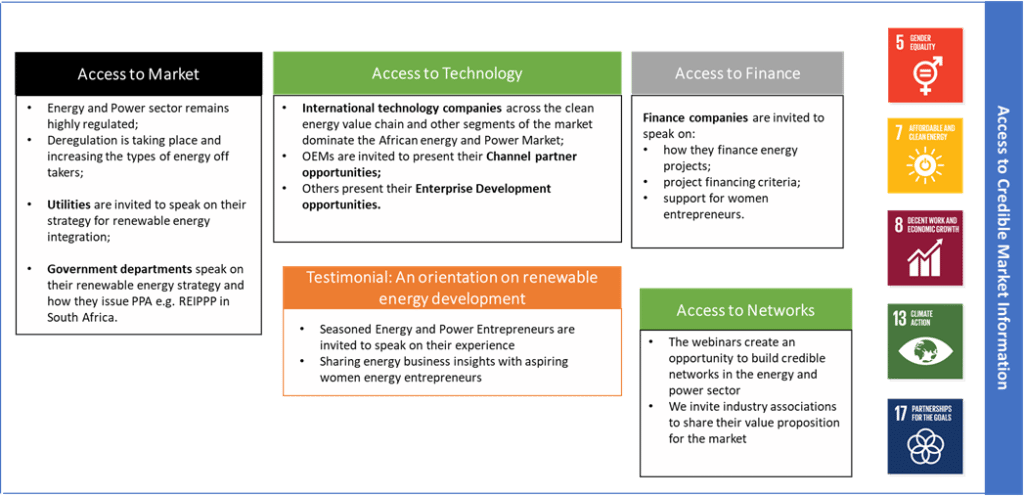
Key Message from Ms Bertha Dlamini, Founding President AWEaP
Own your entrepreneurial journey. Invest in it. Invest time to research and understand the construct of value chains. Make it your mission to build value adding and reciprocal networks in the energy and power sector. Stay abreast of developments and pursue opportunities with tenacity.
Ms Bertha Dlamini, Founding President AWEaP, Feb 2023
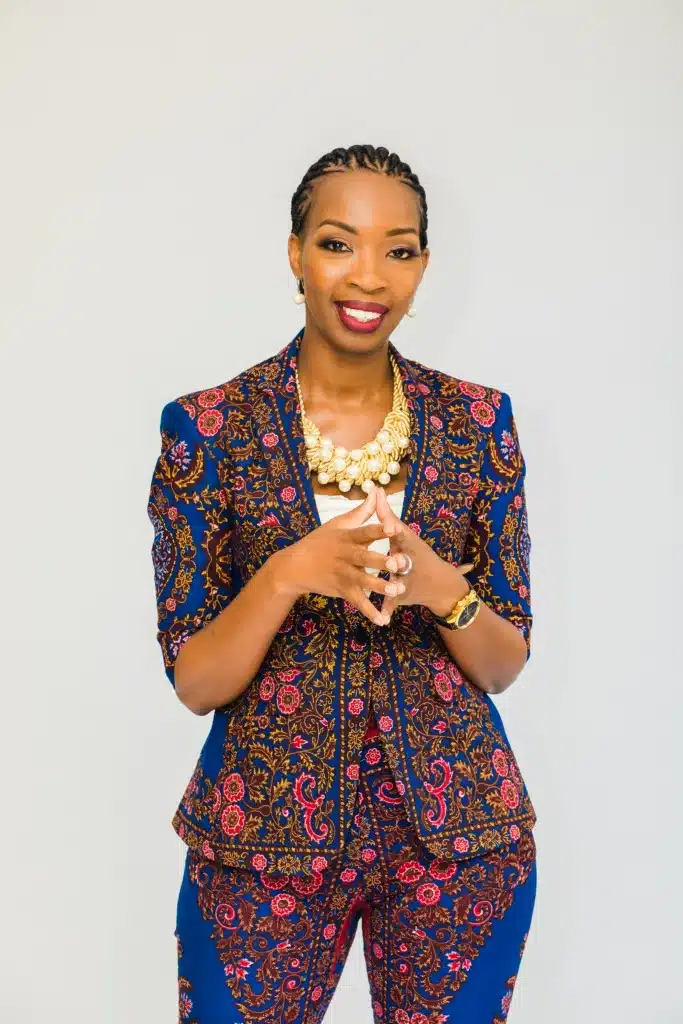
You can have more information about African Women in Energy and Power (AWEaP) on their website: https://aweap.africa/
FOLLOW US ON OUR CHANNELS
Follow us on LINKEDIN, FACEBOOK, TELEGRAM GROUP and WHATSAPP.
*** ALSO CHECK: 12 CHALLENGES FACED BY SOLAR COMPANIES IN DEVELOPING COUNTRIES
ABBREVIATIONS IN THE SOLAR ENERGY SECTOR
HOW TO SIZE A SOLAR SYSTEM – 5 clear steps anyone can follow
Leading the Charge: How Gadgetronix is Revolutionizing the Solar Energy Industry in Tanzania

